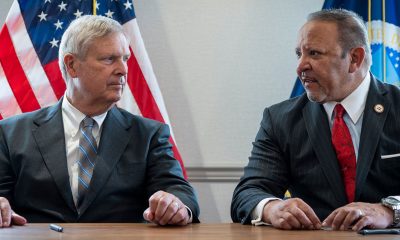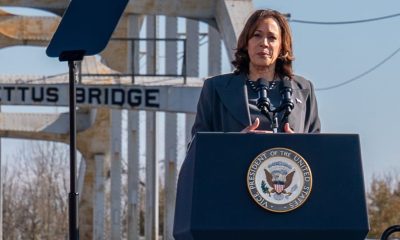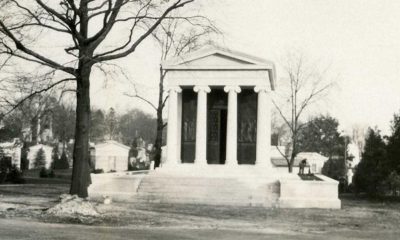#NNPA BlackPress
MLK at 90: On King’s 90th birthday, five contemporaries offer perspective
NNPA NEWSWIRE — Dr. King’s tragic death here in Memphis on April 4, 1968 came when he was 39. He died as he lived: Absolutely committed to changing for the better factors that affect quality and length of life, particularly for African Americans.
By Sybil C. Mitchell, The New Tri-State Defender
The life expectancy at birth for an African American man born as Dr. Martin Luther King Jr. was in 1929, would have been about 47, according to Vol. 50, No. 6 of the National Vital Statistics Reports. For women, it would have been 49.
By contrast, the life expectancy for white men and white women would have been 60 and 64, respectively.
Dr. King’s tragic death here in Memphis on April 4, 1968 came when he was 39. He died as he lived: Absolutely committed to changing for the better factors that affect quality and length of life, particularly for African Americans.
Statistics suggest that while life expectancies have improved across the board for decades, deep rooted disparities remain. The five, ninety-something men and women interviewed by The New Tri-State Defender for this story acknowledged changes and remaining challenges when asked to reflect on the context of Dr. King.

Barbara Cooper
Barbara Cooper, 89
Tennessee House of Representatives (D-86)
Date of Birth: August 4, 1929
“In the five decades Dr. King has been gone, there have been so many wonderful achievements made by black people. He would have been thrilled to see African Americans achieving in every walk of life.
“He would have just been so pleased and proud – so excited… on that November night in 2008 when President Barack Obama became the first African American to be elected to the nation’s highest office. I can see him up in Washington calling President Obama his ‘son.’
“When it comes to our black youth killing one another, he would have been so dismayed. But then, I also think that had he lived, and had he remained here to shepherd the movement and mobilize our leaders and our youth, we would not have this widespread phenomenon of young black men and women killing each other.
“He would have guided us with his vision. There seems to be no vision for our children except locking them up. As we remember his legacy this month, we must be reminded that there is yet so much work to do. There is no time to sit down and rest when our children can’t read and have no way of competing in the future with their peers, unless we continue Dr. King’s work in serving and uplifting our community.”

Dr. James L. Netters
Dr. James L. Netters, 92
Mt. Vernon Baptist Church- Westwood, Pastor Emeritus
Date of Birth: September 10, 1927
“Of course, God has brought us through so many trials and challenges. We enjoy a quality of life that only existed back then in the imagination of Dr. King.
“I remember as a young preacher in 1963 going to Washington where Dr. King delivered his ‘I Have A Dream’ speech. I helped set up the stage as thousands and thousands of people gathered there at the Lincoln Memorial. We were setting up, and I remember sitting down at the back of the stage when he began speaking. I was riveted to that seat as he encouraged and uplifted us all.
“After that, I would have the opportunity to meet with him several times at his room in the Lorraine Motel. He would stay in that same room all the time. Of course, we marched along side of him during the Sanitation Strike.
“But before that time, it was in 1964, seven of us were inspired by Dr. King to stage a sit-in on the city bus. We were arrested, and they put me in the car with Jesse Turner (former national NAACP treasurer, Tri-State Bank president and Shelby County Commissioner). While we were in that police car, Jesse told me to pray, and I said:
“‘Lord Jesus, forgive these police officers for taking us to jail, for they know not what they do. They are arresting us because they want to maintain the status quo. But forgive them, Lord.’
“Then, one of the officers put his hand on his billy club and said, ‘OK, preacher, that’s enough.’
“Then I said very loudly, ‘And Lord, AMEN.’ Jesse and I would laugh about that for many years.
“But Dr. King’s dream is still alive, and I carry it, living in the dream, and it is still just as strong and as forceful as it was in 1963.”

Dr. Erma Clanton
Dr. Erma Clanton, Professor Emeritus, 95
University of Memphis
Date of Birth: February 5, 1923
“I was working on my master’s degree at the University of Memphis when he was assassinated. Like most young, African American people, we were inspired to give of ourselves in serving and helping others.
“I began teaching english and speech at Melrose High School in 1969. We had to be more than just teachers in the classroom. We were parents and counselors and nurturers of our students. Dr. King was driven by the vision of our children doing better than we did, each generation becoming more and more successful.
“As I moved to the University of Memphis and began teaching Theater and Communications, I tried always to create new opportunities for our children to act, to speak and to communicate effectively. Those were heady days when we performed all over the country versions of my original stage production, ‘An Evening of Soul.’
“Many students were the first to attend college, and on the high school level, some of those children had no dream of attending college after graduation. Those shows instilled a sense of pride and beauty in being ‘young, gifted and black,’ to use the words of a songwriter.
“I like to think that Dr. King would have loved those productions and what I was trying to do…”

Norvelle Sanders
Norvelle Sanders, 88
Member of Kappa Alpha Psi for 70 years
Date of Birth: December 5, 1930
“I was born in Yazoo City, Miss. My mother left me with my grandparents who lived in Memphis. She went up to Detroit to get a good job.
“I graduated from Fisk University, where I pledged Kappa. After graduation, I went up to Michigan to live with my mother. I stayed a few years, but then returned to Memphis in 1960.
“Back when Dr. King was involved in the civil rights movement, the Kappas as well as all the black Greek organizations stood with him. Organization of the marches and protests were coordinated through ministers and their churches.
“And so, there was a strong, Greek presence in Dr. King’s efforts and other civil rights leaders through the churches…
“Mr. Obama is the embodiment of Dr. King’s dream for future generations of black children. If his spirit was anywhere around the inauguration, he was leaping with joy.”

Opal Carpenter Mayfield
Opal Carpenter Mayfield, 90
Retired Teacher
Date of Birth: February 5, 1928
“…Dr. King had galvanized blacks all over the nation. We were left with his dream, and that helped to move us forward.
“My husband and I had six children. He died of cancer when they were very young. I raised them by myself, all six – four boys and two girls. All of them have masters and doctorate degrees.
“That day when Dr. King was killed, I believe we all realized that quitting was not an option, and failure was not an option. It was a sad day, and all we could do was pray.
“I taught school and retired after 30 years. … I believe all educators felt a duty and responsibility to guide and nurture our kids, not just in the classroom, but we had to teach them life lessons that would carry them through to adulthood.
“All of us were part of Dr. King’s legacy. We had to go on. We had to embrace the dream for all our children.”
#NNPA BlackPress
Beloved Actor and Activist Louis Cameron Gossett Jr. Dies at 87
NNPA NEWSWIRE — Louis Gossett Jr., the groundbreaking actor whose career spanned over five decades and who became the first Black actor to win an Academy Award as Best Supporting Actor for his memorable role in “An Officer and a Gentleman,” has died. Gossett, who was born on May 27, 1936, in Brooklyn, N.Y., was 87. Recognized early on for his resilience and nearly unmatched determination, Gossett arrived in Los Angeles in 1967 after a stint on Broadway.
The post Beloved Actor and Activist Louis Cameron Gossett Jr. Dies at 87 first appeared on BlackPressUSA.

By Stacy M. Brown
NNPA Newswire Senior National Correspondent
@StacyBrownMedia
Louis Gossett Jr., the groundbreaking actor whose career spanned over five decades and who became the first Black actor to win an Academy Award as Best Supporting Actor for his memorable role in “An Officer and a Gentleman,” has died. Gossett, who was born on May 27, 1936, in Brooklyn, N.Y., was 87. Recognized early on for his resilience and nearly unmatched determination, Gossett arrived in Los Angeles in 1967 after a stint on Broadway.
He sometimes spoke of being pulled over by law enforcement en route to Beverly Hills, once being handcuffed to a tree, which he remembered as a jarring introduction to the racial tensions of Hollywood. In his memoir “An Actor and a Gentleman,” Gossett recounted the ordeal, noting the challenges faced by Black artists in the industry. Despite the hurdles, Gossett’s talent shone brightly, earning him acclaim in groundbreaking productions such as “A Raisin in the Sun” alongside Sidney Poitier. His Emmy-winning portrayal of Fiddler in “Roots” solidified his status as a trailblazer, navigating a landscape fraught with racial prejudice.
According to the HistoryMakers, which interviewed him in 2005, Gossett’s journey into the limelight began during his formative years at PS 135 and Mark Twain Junior High School, where he demonstrated early leadership as the student body president. His passion for the arts blossomed when he starred in a “You Can’t Take It With You” production at Abraham Lincoln High School, catching the attention of talent scouts who propelled him onto Broadway’s stage in “Take A Giant Step.” His stellar performance earned him the prestigious Donaldson Award for Best Newcomer to Theatre in 1952. Though initially drawn to sports, Gossett’s towering 6’4” frame and athletic prowess led him to receive a basketball scholarship at New York University. Despite being drafted by the New York Knicks in 1958, Gossett pursued his love for acting, honing his craft at The Actors Studio under the tutelage of luminaries like John Sticks and Peggy Fury.
In 1961, Gossett’s talent caught the eye of Broadway directors, leading to roles in acclaimed productions such as “Raisin in the Sun” and “The Blacks,” alongside legends like James Earl Jones, Cicely Tyson, Roscoe Lee Brown, and Maya Angelou. Transitioning seamlessly to television, Gossett graced small screens with appearances in notable shows like “The Bush Baby” and “Companions in Nightmare.” Gossett’s silver screen breakthrough came with his role in “The Landlord,” paving the way for a prolific filmography that spanned over 50 movies and hundreds of television shows. From “Skin Game” to “Lackawanna Blues,” Gossett captivated audiences with his commanding presence and versatile performances.
However, his portrayal of “Fiddler” in Alex Haley’s groundbreaking miniseries “Roots” earned Gossett critical acclaim, including an Emmy Award. The HistoryMakers noted that his golden touch extended to the big screen, where his role as Sergeant Emil Foley in “An Officer and a Gentleman” earned him an Academy Award for Best Supporting Actor, making him a trailblazer in Hollywood history.
Beyond the glitz and glamour of Hollywood, Gossett was deeply committed to community activism. In 1964, he co-founded a theater group for troubled youth alongside James Earl Jones and Paul Sorvino, setting the stage for his lifelong dedication to mentoring and inspiring the next generation. Gossett’s tireless advocacy for racial equality culminated in the establishment of Eracism, a nonprofit organization dedicated to combating racism both domestically and abroad. Throughout his illustrious career, Gossett remained a beacon of strength and resilience, using his platform to uplift marginalized voices and champion social change. Gossett is survived by his children, Satie and Sharron.
The post Beloved Actor and Activist Louis Cameron Gossett Jr. Dies at 87 first appeared on BlackPressUSA.
#NNPA BlackPress
COMMENTARY: D.C. Crime Bill Fails to Address Root Causes of Violence and Incarceration
WASHINGTON INFORMER — The D.C. crime bill and so many others like it are reminiscent of the ‘94 crime bill, which produced new and harsher criminal sentences, helped deploy thousands of police and surveilling methods in Black and brown communities, and incentivized more states to build prisons through a massive infusion of federal funding. While it is not at the root of mass incarceration, it significantly accelerated it, forcing a generation of Black and brown families into a never-ending cycle of state-sanctioned violence and incarceration.
The post COMMENTARY: D.C. Crime Bill Fails to Address Root Causes of Violence and Incarceration first appeared on BlackPressUSA.

By Kaili Moss and Jillian Burford | Washington Informer
Mayor Bowser has signed the “Secure DC” omnibus bill passed by the D.C. Council last month. But we already know that this bill will be disastrous for all of D.C., especially for Black and brown residents.
While proponents claim that this legislation “will make D.C. residents safer and more secure,” it actually does nothing to address the root of the harm in the first place and instead maintains a cycle of violence, poverty, and broken community ties. The omnibus bill calls for increased surveillance, drug-free zones, and will expand pre-trial detention that will incarcerate people at a significantly higher rate and for an indeterminate amount of time before they are even tried. This bill will roll back decades of nationwide policy reform efforts and initiatives to keep our communities safe and whole, which is completely contradictory to what the “Secure” D.C. bill claims it will do.
What is unfolding in Washington, D.C., is part of a dangerous national trend. We have seen a resurrection of bad crime bills in several jurisdictions across the country — a phenomenon policy experts have named “zombie laws,” which are ineffective, costly, dangerous for communities of color and, most importantly, will not create public safety. Throwing more money into policing while failing to fund preventative measures does not keep us safe.
The D.C. crime bill and so many others like it are reminiscent of the ‘94 crime bill, which produced new and harsher criminal sentences, helped deploy thousands of police and surveilling methods in Black and brown communities, and incentivized more states to build prisons through a massive infusion of federal funding. While it is not at the root of mass incarceration, it significantly accelerated it, forcing a generation of Black and brown families into a never-ending cycle of state-sanctioned violence and incarceration. Thirty years later, despite spending billions each year to enforce these policies with many of these provisions remaining in effect, it has done very little to create long-term preventative solutions. Instead, it placed a permanent moving target on the backs of Black people, and the D.C. crime bill will do the same.
The bill calls for more pretrial detention. When our loved ones are held on pretrial detention, they are held on the presumption of guilt for an indeterminate amount of time before ever seeing a judge, which can destabilize people and their families. According to experts at the Malcolm Weimer Center for Social Policy at Harvard University, just one day in jail can have “devastating consequences.” On any given day, approximately 750,000 people are held in jails across the nation — a number that beats our nation’s capital population by about 100,000. Once detained, people run the risk of losing wages, jobs, housing, mental and health treatments, and time with their families. Studies show that pretrial detention of even a couple of days makes it more likely for that person to be rearrested.
The bill also endangers people by continuing a misguided and dangerous War on Drugs, which will not get drugs off the street, nor will it deter drug use and subsequent substance use disorders (SUDs). Drug policies are a matter of public health and should be treated as such. Many states such as Alabama, Iowa and Wisconsin are treating the current fentanyl crisis as “Crack 2.0,” reintroducing a litany of failed policies that have sent millions to jails and prisons instead of prioritizing harm reduction. Instead, we propose a simple solution: listen to members of the affected communities. Through the Decrim Poverty D.C. Coalition, community members, policy experts and other stakeholders formed a campaign to decriminalize drugs and propose comprehensive legislation to do so.
While there are many concerning provisions within the omnibus bill, car chases pose a direct physical threat to our community members. In July 2023, NBC4 reported that the D.C. Council approved emergency legislation that gave MPD officers the ability to engage in vehicular pursuits with so-called “limited circumstances.” Sgt. Val Barnes, the head of MPD’s carjacking task force, even expressed concern months before the decision, saying, “The department has a pretty strict no-chase policy, and obviously for an urban setting and a major metropolitan city, that’s understandable.” If our law enforcement officers themselves are operating with more concern than our elected officials, what does it say about the omnibus bill’s purported intention to keep us safe?
And what does it mean when the risk of bodily harm is posed by the pursuit itself? On Saturday, Feb. 10, an Eckington resident had a near-miss as a stolen car barreled towards her and her dog on the sidewalk with an MPD officer in pursuit. What responsibility does the city hold if this bystander was hit? What does restitution look like? Why are our elected officials pushing for MPD officers to contradict their own policies?
Just a few summers ago during the uprisings of 2020, we saw a shift in public perspectives on policing and led to legislation aimed at limiting police power after the highly-publicized murders of loved ones Breonna Taylor and George Floyd — both victims of War on Drugs policing and the powers gained from the ’94 crime bill. And yet here we are. These measures do not keep us safe and further endanger the health of our communities. Studies show that communities that focus on harm reduction and improving material conditions have a greater impact on public safety and community health. What’s missing in mainstream conversations about violent crime is the violence that stems from state institutions and structures that perpetuate racial and class inequality. The people of D.C. deserve to feel safe, and that includes feeling safe from the harms enacted by the police.
Kaili Moss is a staff attorney at Advancement Project, a national racial justice and legal organization, and Jillian Burford is a policy organizer at Harriet’s Wildest Dreams.
The post COMMENTARY: D.C. Crime Bill Fails to Address Root Causes of Violence and Incarceration first appeared on BlackPressUSA.
#NNPA BlackPress
Mayor, City Council President React to May 31 Closing of Birmingham-Southern College
THE BIRMINGHAM TIMES — “This is a tragic day for the college, our students, our employees, and our alumni, and an outcome so many have worked tirelessly to prevent,” Rev. Keith Thompson, chairman of the BSC Board of Trustees said in an announcement to alumni. “We understand the devastating impact this has on each of you, and we will now direct our efforts toward ensuring the smoothest possible transition for everyone involved.”
The post Mayor, City Council President React to May 31 Closing of Birmingham-Southern College first appeared on BlackPressUSA.

By Barnett Wright | The Birmingham Times
Birmingham-Southern College will close on May 31, after more than a century as one of the city’s most respected institutions.
“This is a tragic day for the college, our students, our employees, and our alumni, and an outcome so many have worked tirelessly to prevent,” Rev. Keith Thompson, chairman of the BSC Board of Trustees said in an announcement to alumni. “We understand the devastating impact this has on each of you, and we will now direct our efforts toward ensuring the smoothest possible transition for everyone involved.”
There are approximately 700 students enrolled at BSC this semester.
“Word of the decision to close Birmingham Southern College is disappointing and heartbreaking to all of us who recognize it as a stalwart of our community,” Birmingham Mayor Randall Woodfin said in a statement. “I’ve stood alongside members of our City Council to protect this institution and its proud legacy of shaping leaders. It’s frustrating that those values were not shared by lawmakers in Montgomery.”
Birmingham City Council President Darrell O’Quinn said news of the closing was “devastating” on multiple levels.
“This is devastating for the students, faculty members, families and everyone affiliated with this historic institution of higher learning,” he said. “It’s also profoundly distressing for the surrounding community, who will now be living in close proximity to an empty college campus. As we’ve seen with other institutions that have shuttered their doors, we will be entering a difficult chapter following this unfortunate development … We’re approaching this with resilience and a sense of hope that something positive can eventually come from this troubling chapter.”
The school first started as the merger of Southern University and Birmingham College in 1918.
The announcement comes over a year after BSC officials admitted the institution was $38 million in debt. Looking to the Alabama Legislature for help, BSC did not receive any assistance.
This past legislative session, Sen. Jabo Waggoner sponsored a bill to extend a loan to BSC. However, the bill subsequently died on the floor.
Notable BSC alumni include former New York Times editor-in-chief Howell Raines, former U.S. Sen. Howell Heflin and former Alabama Supreme Court Chief Justice Perry O. Hooper Sr.
This story will be updated.
The post Mayor, City Council President React to May 31 Closing of Birmingham-Southern College first appeared on BlackPressUSA.
-

 Activism4 weeks ago
Activism4 weeks agoOakland Post: Week of March 20 – 26, 2024
-

 #NNPA BlackPress3 weeks ago
#NNPA BlackPress3 weeks agoCOMMENTARY: D.C. Crime Bill Fails to Address Root Causes of Violence and Incarceration
-

 #NNPA BlackPress3 weeks ago
#NNPA BlackPress3 weeks agoMayor, City Council President React to May 31 Closing of Birmingham-Southern College
-

 #NNPA BlackPress3 weeks ago
#NNPA BlackPress3 weeks agoFrom Raids to Revelations: The Dark Turn in Sean ‘Diddy’ Combs’ Saga
-

 #NNPA BlackPress3 weeks ago
#NNPA BlackPress3 weeks agoCOMMENTARY: Lady Day and The Lights!
-

 #NNPA BlackPress3 weeks ago
#NNPA BlackPress3 weeks agoBaltimore Key Bridge Catastrophe: A City’s Heartbreak and a Nation’s Alarm
-

 #NNPA BlackPress3 weeks ago
#NNPA BlackPress3 weeks agoBaltimore’s Key Bridge Struck by Ship, Collapses into Water
-

 Activism3 weeks ago
Activism3 weeks agoOakland Post: Week of March 27 – April 2, 2024





















































1 Comment